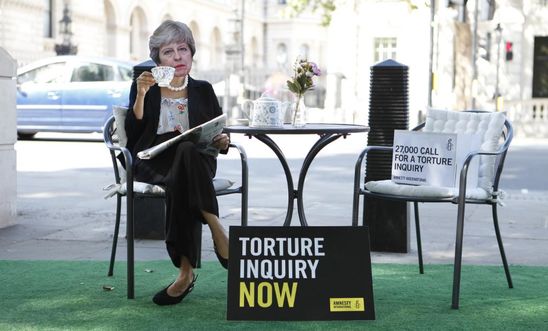
Is the UK government turning a blind eye to torture?

By Rachel Logan - Law and Human Rights Programme Director at Amnesty UK
'The Cameron coalition government gave a firm promise to parliament that it would hold a full, independent judge-led inquiry…I have to say I feel somewhat betrayed by the fact that the present government, now that the police inquiries are over, has so far not seen fit to honour that commitment, for reasons that I do not understand' Ken Clarke MP, Justice Secretary and Lord Chancellor when the government promised to hold an inquiry into torture and abuse.
An incomplete inquiry
When the UK government backtracked on its earlier "sombre undertaking" to hold a full judicial inquiry into claims its officials were involved in rendition, torture and mistreatment of detainees by other countries – instead, handing the investigation over to the parliamentary intelligence and security committee (ISC) – Amnesty was one of the many organisations to raise concerns.
Access denied
Amongst those concerns was the fear that the ISC, the group of parliamentarians charged with carrying out the secretive review, had no power to demand access to witnesses or documents and could be blocked from seeing crucial evidence by the government. We did not believe the ISC was institutionally capable of discharging the UK’s duty to hold an independent, effective inquiry into what went wrong, what really happened and what lessons had to be learned to prevent this ever happening again.
'We reached the point in our inquiry where we had covered the breadth of the issues but needed to examine certain matters in detail, which could only be done by taking evidence from those who had been on the ground at the time. We have been denied that access…The terms and conditions imposed were such that we would be unable to conduct an authoritative Inquiry and produce a credible report.' Executive Summary, ISC Report, 28 June 2018
Access to witnesses denied
Last month, the ISC “reluctantly” closed their own inquiry. They did so because they had been blocked by the Prime Minister from accessing key witnesses. Those were the first (but not the final) witnesses whose evidence the ISC believed was essential to produce a credible report capable of determining the truth.
Frustrated and unable to force access to those witnesses, the ISC felt they had no choice but to discontinue their inquiry. Instead, they published their findings up to that point but accompanied those with the large health warning that this should not in any sense be viewed as an authoritative account.
It’s tempting to say we told you so, but such a response would cheapen the very real cost (financial as well as in real terms for any victims past, present or future) of the government’s mistake.
Hundreds of cases of extraordinary rendition overlooked
Shortly before the ISC reports were published, the government issued its first, landmark public apology for its role in the torture and rendition of Mr Belhaj and Mrs Bouchdar, who suffered horrific abuses after the UK helped hand them over to Libyan authorities. But those cases, like so many others, have not yet been properly looked at. And yet the Prime Minister still hasn't accepted her responsibility to order that full, independent inquiry to begin.
They knew abuses were happening
There are hundreds of cases of the British government planning or paying for extraordinary rendition, or allowing UK officials to become involved, despite knowing abuses were happening. In one US ‘torture centre’ in Iraq, UK officials questioned detainees in an adjacent cabin as a “workaround” before handing them back. In another incident one MI6 officer questioned a detainee alongside US personnel before witnessing the man being driven in a ‘6ft sealed box’ to be illegally rendered on a US plane. These may well be the tip of the iceberg.
There needs to be a proper independent inquiry
If the individuals involved are ever to be held accountable, these cases and all others like them must receive a proper independent inquiry.
At a time when:
- President Trump has threatened to bring back waterboarding and "a hell of a lot worse";
- the UK government has refused to seek its usual assurances that British citizens won’t be subjected to the death penalty by the US;
- and the Defence Secretary has suggested British troops should break the law by carrying out targeted extrajudicial killings of British jihadists,
it is critical that lessons are learned from how things went so wrong before, and that changes are made to help ensure that UK officials are never again involved in gross human rights violations in the so-called ‘war on terror’.
The government has now promised to respond to calls from senior cross-party MPs and civil servants for a judicial inquiry by the end of August. We handed in our 27,000-strong petition to Downing Street on Monday, 6 August together with some of our partner organisations, showing just how seriously our activists take this issue. The Prime Minister must not turn a blind eye to torture. There is too much at stake.
Our blogs are written by Amnesty International staff, volunteers and other interested individuals, to encourage debate around human rights issues. They do not necessarily represent the views of Amnesty International.
0 comments